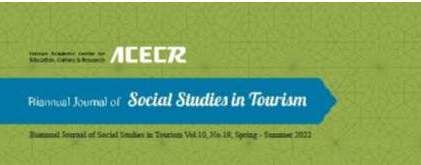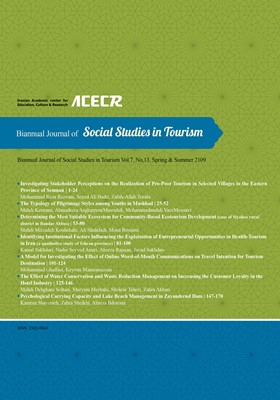Determining the Most Suitable Ecosystem for Community-Based Ecotourism Development: case of Siyahoo rural district in Bandar
Subject Areas :1 * , Ali Shahdadi 2 , 3
1 -
2 -
3 -
Keywords: community-based ecotourism (CBET) sustainable ecotourism local community Siyahoo rural district Bandar Abbas ,
Abstract :
Sustainability in ecotourism requires comprehensive participation of the host community in ecotourism projects. Community-based ecotourism (CBET) is an approach in which the local community acts as the founder and promoter of ecotourism and it takes part in its development. This paper tried to locate community-based ecotourism as a development model in Siyahoo rural district. The paper wanted to answer: where are the most suitable ecosystems in Siyahoo rural district for developing CBET according to economic, socio-cultural, institutional-physical and environmental indices. This is an applied and developmental research, which followed a descriptive method in data collection and analyzed them quantitatively. The statistical population included the local communities, tourists, experts and elites in the tourism sector. Data were collected from four tourist rural areas (Siayhoo, Kharsin, Banglayan, and Sikhoran) in the Siyahoo rural district using interviews and questionnaires by Purposive Quota-Sampling. Participants included 370 people from the local community, 359 tourists from the Siyahoo rural district and 15 experts and elites. SPSS 22 was used to analyze the data, and the SWOT technique to determine the CBET development strategies. The findings of the assessed elements (including economic, socio-cultural, institutional-physical and environmental indices) showed that Bangelayan village had the highest capability to develop community-based ecotourism in Siyahoo.
اکبریان رونیزی، سعید رضا؛ رضوانی، محمد رضا. (1394). «تحلیل و تبیین پایداری توسعه گردشگری در مناطق روستایی (مطالعه موردی: بخش مرکزی شهرستان دماوند)». پژوهشهای جغرافیای انسانی. دوره 47. شماره 1. بهار 1394. ص 81 – 95.
حجاریان، مرضیه؛ خالدی کوره، فرانگیز؛ حسینزاده، امید؛ علیجانپور، احمد. (1395). «شاخصهاي راهبردي مؤثر بر توسعه اکوتوریسم جامعهمحور در جنگلهاي ارسباران». فصلنامه پژوهش و توسعه جنگل. دوره 2. شماره 2. تابستان 1395. ص111-129.
رکن الدین افتخاری، عبدالرضا؛ مهدوی، داوود؛ پورطاهری، مهدی. (1390). «فرآیند بومیسازی شاخصهای توسعه پایدار گردشگری روستایی درایران.» پژوهشهای روستایی. دوره 1. شماره4. زمستان 1390. ص 1 – 41.
ضرغام بروجنی، حمید؛ بذرافشان، شیما. (1395). «میزان موفّقیت توسعة گردشگری جامعهمحور روستایی از دید جامعة محلّی (مطالعه موردی: روستای آسیابسر، شهرستان بهشهر)». مجله پژوهش و برنامهریزی روستایی. دوره 5 . شمارة 4. ص 136-119.
فاضل بخششی، فرشته. (1387). گردشگری جامعه محور، راهکاری جهت توسعه و پایداری گردشگری در ایران. مرکز گردشگری علمی- فرهنگی دانشجویان ایران.
فرگوسن، جرج اندرو و یوشیو، تاکانه.(1392). تحلیل آماری در روانشناسی و علوم تربیتی. ترجمه علی دلاور و سیامک نقشبندی، تهران: ارسباران.
مرکز آمار ایران .(1395). نتایج سرشماری عمومی نفوس و مسکن، جمعیت به تفکیک تقسیمات کشوری (18/5/95)https://www.amar.org.ir
منصورفر،کریم. (1387). روشهای پیشرفته آماری. چاپ اول. تهران: انتشارات دانشگاه تهران.
Auesriwong, A., Nilnoppakun, A., & Parawech, W. (2015). Integrative Participatory Community-based Ecotourism at Sangkhom District, Nong Khai Province, Thailand. Procedia Economics and Finance, (23) 1, 778-782.
Bith, B. (2011). Community-based ecotourism and empowerment of indigenous people: the case of Yeak Laom community developmenta Thesis Submitted in Partial Fulfilment of the Requirements for the Degree of Master of Tourism Management at Lincoln University, Cambodia.
Drakopoulou, A. (2011). Tourism Certification and Community-based Ecotourism as Tools for Promoting Sustainability in the Greek Tourism Sector- the example of Zagori. Submitte in Partial Fulfillment of the Requirements of the International Master in Environmental Sciences Degree, Lund University, Sweden.
Fiorello, A., & Bo, D. (2012). Community-based ecotourism to meet the new tourist's expectations: An exploratory study. Journal of Hospitality Marketing & Management, (7) 21,758-778.
Gui, Y. L., Fang, Y. G., & Liu, J. S. (2004). Community-based ecotourism in nature reserve of China. Chinese Geographical Science, (14) 3, 276-282.
Gurung, D. B., & Scholz, R. W. (2008). Community-based ecotourism in Bhutan: expert evaluation of stakeholder-based scenarios. The International Journal of Sustainable Development & World Ecology, (15) 5, 397-411.
Harris، R. & Vogel, D. (2002). E-commerce for community based tourism in developing countries, city university of HongKong, Department of information.
Hitchner, S. L., Apu, F. L., Tarawe, L., Galih N, Aran, S., & Yesaya, E. (2009). Community-based transboundary ecotourism in the heart of Borneo: a case study of the Kelabit Highlands of Malaysia and the Kerayan Highlands of Indonesia. Journal of Ecotourism, (8) 2, 193-213.
Iqbal, M. M., Shahwahid, H. M & Farah, A. M. (2013). Assessing service quality of community-based ecotourism: A case study from Kampung Kuantan Firefly Park. Journal of Tropical Forest Science, (25)1,22-33.
Ketema, T. D. (2015). Development of community based ecotourism in Wenchi Crater Lake, Ethiopia: Challenges and prospects. Journal of Hospitality Management and Tourism, (6) 4, 39-46. Kiss, A. (2004). Is community-based ecotourism a good use of biodiversity conservation funds? Trends in ecology & evolution, (19) 5, 232-237.
Manu, I., & Kuuder, C. J. W. (2012). Community-based ecotourism and livelihood enhancement in Sirigu, Ghana.
Masud, M. M., Aldakhil, A. M., Nassani, A. A., & Azam, M. N. (2017). Community-based ecotourism management for sustainable development of marine protected areas in Malaysia. Journal of Ocean & Coastal Management, 136, 104-112.
Neth, B. (2008) Ecotourism as a Tool for Sustainable Rural Community Development and Natural Resources Management in the Tunel Sap Biosphre Reserve, Germany, Kassel University Press. www.unikassel.de/upress/online/.../ 978-3-89958-465-3.volltext.frei.pdf [accessdate:1/2014].
Obadić, A., & Marić, I. (2009). The significance of tourism as an employment generator of female labour force. Ekonomska misao i praksa, (1) 1 93-114.
Reimer, J. K., & Walter, P. (2013). How do you know it when you see it? Community-based ecotourism in the Cardamom Mountains of southwestern Cambodia. Journal of Tourism Management, (34) 1, 122-132.
Ross, S. and Wall, G. (1999). Ecotourism: Towards Congruence between Theory and Practice, Tourism Management, (20) 1, 123-132.
Suansri, P. (2003). Community based tourism handbook. Responsible Ecological Social Tour-REST. Tosun, C. (2005). Stages in the emergence of a participatory tourism development approach in the Developing World. Geoforum, (36) 3, 333-352.
Wang, C. C. (2016). Political challenges in community-based ecotourism. Journal of Sustainable Tourism, (24) 11, 1555-1568.
Zhang, H., & Lei, S. L. (2012). A structural model of residents’ intention to participate in ecotourism: The case of a wetland community. Tourism Management, (33) 4, 925.

